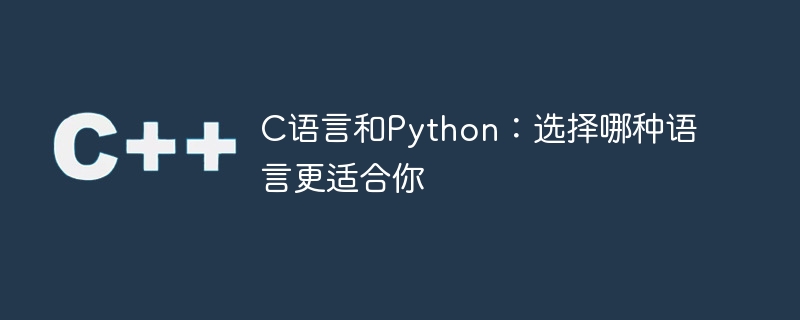

C language and Python: Which language is more suitable for you, you need specific code examples
As the field of computer programming continues to develop, programming languages have also become increasingly diverse. Among these many programming languages, C language and Python are two languages that are widely used and favored by programmers. C language, as a very low-level language, is widely used in system programming and embedded development. Python is popular for its concise and easy-to-understand syntax and powerful library functions, and is used in various fields such as data analysis and artificial intelligence. This article will explore C language and Python from different angles, and use specific code examples to help you choose which language is more suitable for you.
First, let’s look at the differences between these two languages from a grammatical perspective. C language is a structured programming language with a relatively complex syntax that requires programmers to manually manage operations such as memory and pointers. The following is a simple C language sample code:
#include <stdio.h>
int main() {
int a = 10;
printf("The value of a is %d
", a);
return 0;
}Python is a high-level language with simple and easy-to-understand syntax, and does not require programmers to worry about underlying issues such as memory management. The following is a simple Python example code:
a = 10
print(f"The value of a is {a}")As can be seen from the above code, Python's syntax is more concise and intuitive, making it suitable for beginners to get started. If you are a beginner or not very familiar with programming, then Python may be more suitable for you.
Secondly, let’s compare these two languages in terms of performance. Since C language is a compiled language that can be directly compiled into machine code for execution, its performance is usually higher than that of Python. The following is a simple C language performance test code:
#include <stdio.h>
int main() {
int sum = 0;
for (int i = 0; i < 1000000; i ) {
sum = i;
}
printf("The sum is %d
", sum);
return 0;
}The same performance test is implemented with Python code as follows:
sum = 0
for i in range(1000000):
sum = i
print(f"The sum is {sum}")As can be seen from the above code, even for simple loop accumulation operations, the performance of C language is much higher than that of Python. If your project has higher performance requirements, then C language may be more suitable.
Finally, let us compare these two languages in terms of development efficiency and feature richness. Python has many rich third-party libraries that can easily implement various functions, such as data analysis, network programming, etc. The following is a sample code for data analysis using a Python library:
import numpy as np
data = np.array([1, 2, 3, 4, 5])
mean = np.mean(data)
print(f"The mean value is {mean}")The C language requires programmers to write function modules or call system APIs to achieve the same function, and the development efficiency is relatively low. Therefore, if you need to implement a specific function and Python already has a ready-made library that can be used directly, it may be more convenient to choose Python.
In summary, choosing C language or Python depends on your specific needs and background. If you pursue ultimate performance and have a certain understanding of underlying operations and memory management, then C language may be more suitable for you. And if you are a beginner or need to quickly implement a certain function, then Python may be more suitable for you. I hope that the introduction and code examples in this article can help you better choose a programming language that suits you.
The above is the detailed content of C vs. Python: Which language is better for you?. For more information, please follow other related articles on the PHP Chinese website!




